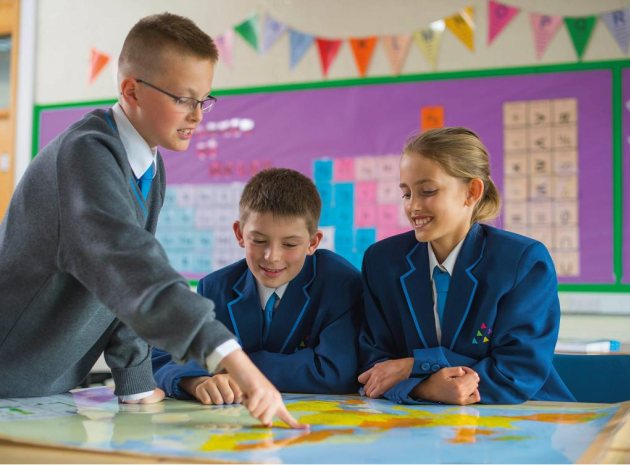This September, Westlands School in Torquay became The Spires College. I felt we needed a very clear signal to the outside world of just how much the school has changed.
Westlands School was placed under special measures in June 2013. The head teacher left and I took up my post as the new principal in September 2014. It has been a very busy year, with lots of ups and downs; nonetheless, there is a real sense of rapid improvement now - we had special measures removed in March 2015 and are aiming to be deemed a ‘good’ school within a year’s time.
Everyone who visits us comments on how positive the school feels and about the good work that is being done, but I felt that this message was not being conveyed widely enough beyond the school walls. Hence our new name – The Spires College – with its new uniform, branding, logo and mission statement, all intended to reflect our high aspirations for the best possible educational experience.
Location, location
Torquay, like many coastal towns has ‘hidden’ poverty – the reality of unemployment, seasonal employment and low wages won’t be described in any of the holiday brochures you may have seen for the English Riviera.
In recent years there has been an increased national awareness of the issues faced in many coastal towns’ schools – but in my opinion this is still not something with which we as a society have fully got to grips.
The reality, as the Local Authority website states, is that the tourism industry dominates our economy and some sectors are in decline, including long stay resort tourism.
In a nutshell, this means that seasonal work and a prevalence of minimum wage jobs coupled with a lack of big employers or a university can create a culture of low aspirations and this, combined with high levels of pastoral need, was something that threatened to undermine this school’s academic provision, just as it does in other schools, in other seaside and rural towns.
Torbay operates a selective education system, with three grammar schools and five comprehensive secondaries. The Spires College is unusual in its status as a bilateral school. This dates back to school’s original inception, when the decision was made to create a selective stream within a comprehensive school.
There are aspects of the school that are very embedded in tradition and hark back to that previous era of success. The old school logo for example, of a lion on a crest, smacks of tradition and history, and the decision to move away from all of that was certainly a difficult one. However, the difficulties of the past few years have tainted that past and I felt it was more important to set our sights on a bright new future – one that suggests aspiration and excellence for all of our students. Hence our revised uniform keeps those important ties to tradition, whilst our vivid new logo shows that this is a school that also embraces modernity and progress.
Onwards and upwards
The name ‘The Spires’ was first mooted because the school sits amid a row of spires on the Torquay skyline. The name also forms part of other words that are key to our core purpose: to inspire and to aspire really sums up our aims. In Latin the word ‘spiro’ means to breathe life into something and that is exactly what we want to do: to energise, excite and bring learning to life.
In recent years I think that the challenges of our demographic profile had been allowed to take precedence over academic progress: students’ under-achievement was almost excused by the fact that many were faced with challenging home lives. Breaking that mind-set was one of the first steps to school improvement. It sounds simple but I still believe this to be one our greatest challenges: ensuring that staff, parents and the students themselves expect high achievement as a matter of course. It is a message that I like to promote constantly.
Raised targets, visits to universities and working with successful alumni have an important part to play in changing the culture. I think the biggest lever for this is the celebration of success; that high achievement is something to be proud of. We are really pushing this celebration to the forefront of what we do – resistance is futile; we will reward and acknowledge achievement at all levels until it becomes the norm to be proud to be doing well in school.
The bilateral stream remains very important to us working, as we do, in a selective system. The appeal of this has been underestimated in the past and this year we have focused on promoting this very unique feature. I would not be comfortable endorsing this to parents if I didn’t believe it provided a genuinely high level of challenge. This year we have enriched our selective stream’s curriculum to include two modern foreign languages from Year 7 and the delivery of Politics, Philosophy and Economics. We have also raised the level of aspiration through academic curriculum changes for all of our students:
That is not to say that we have dismissed the school’s long-standing embracement of vocational provision and strong pastoral care.
These are still bedrocks of our provision but now these supplement, rather than override, academic study and the expectation for excellent progress for all.
The learning journey
In a year of rapid change it can be difficult to pinpoint the most significant changes. However the one thing that will have more impact than any other is the focus on learning. It sounds obvious but how often do we focus on teaching rather than on learning? I want The Spires College to be a centre of continuous learning and this begins with our staff. If we are all learners ourselves, it makes us evaluate our own practice in the classroom because we gain a far greater understanding of what helps us learn.
We want opportunities for CPD to be delivered in a way that models the importance of having the right levels of challenge and engagement. Last year we implemented a programme of weekly Teaching and Learning forums which develop key aspects of pedagogy, such as questioning and differentiation; explore current developments in or research into learning; or look into initiatives in other schools. What was a consistent aim, however, was that the delivery of these sessions should model good classroom practice. Attendance was voluntary; it was fantastic to see teachers engaging with these forums and giving up their time to their own learning.
This year we’ve taken a further step and made this a needs-driven process: a ‘menu’ of professional learning was available to teachers at the start of the year so that individual learning plans could be drawn up. The logical progression for this will then be to begin a programme of in-school research, accrediting staff for their learning.
Meeting the challenge
The process of being under special measures meant that lessons were scrutinised closely and this has resulted in teachers becoming very self-conscious about themselves in the classroom. Planning became all about the teaching, all ‘bells and whistles’ if you like, rather than on how all of the teacher’s efforts were impacting on learning and progress of students. Again, the answer to this has been to refocus on learning. Our learning walks now look at learning before they look at teaching: we try to observe the lesson from a student’s perspective and our notes focus on what students are able to do as a result of the teaching rather than on the teaching itself.
In our Section 5 Inspection earlier this year, behaviour and safety was graded as ‘good’ and again I believe this to be a result of our focus on learning. We introduced a support system that meant that senior and pastoral staff are charged with supporting students within lessons to amend their behaviour so that they can continue learning. A simple policy that serves to reinforce our key message: learning is the most important part of what we do.
Of course the past two years have been gruelling and taken their toll on staff morale. However what is most heartening is the high proportion of staff who have really got on board with changes because they too believe that our children’s futures matter above all else. There is a willingness to go above and beyond to meet the needs of our students and it is that which motivates our staff to ever greater things. When I took up this post, it felt like there was a mountain to climb and sometimes it still does! However, when I step back and look at all the good things that are going on and all of the progress we’ve made, there is a real sense of achievement.
As you walk around our school, it feels like a good place to be – it’s vibrant and exciting and our pupils are thriving. The facilities are great – really great; and our students are truly brilliant young people who deserve the best. Yes, there is a lot still to do and I will keep on pushing for excellence throughout. However I am looking forward to the future, with everyone in our school community working together to be the best that they can be.










